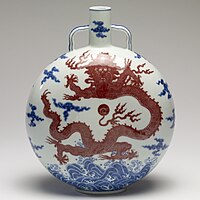
Photo from wikipedia
ABSTRACT Scratch resistance is an important parameter to meet the criteria for purchasing the tableware glazes at the hotels, restaurants and cafes. Scratch resistance of porcelain glazes depends on the… Click to show full abstract
ABSTRACT Scratch resistance is an important parameter to meet the criteria for purchasing the tableware glazes at the hotels, restaurants and cafes. Scratch resistance of porcelain glazes depends on the smoothness of the surface. Smoothness of the glaze surface is influenced by chemical and physical properties of the corresponding components. In this study, the parameters affecting scratch resistance behavior of the glaze in terms of quartz particle size and distribution were investigated. Furthermore, semitransparent porcelain glazes formed at 1250°C were prepared by using a series of quartz samples with different particle size and distribution. The glaze samples were fired according to semitransparent porcelain production heat treatment cycle and characterized in terms of thermal and microstructural behavior by digital microscopy, differential thermal analyses, hot stage microscopy, X-ray diffraction and scanning electron microscopy. GRAPHICAL ABSTRACT
Journal Title: Transactions of the Indian Ceramic Society
Year Published: 2018
Link to full text (if available)
Share on Social Media: Sign Up to like & get
recommendations!